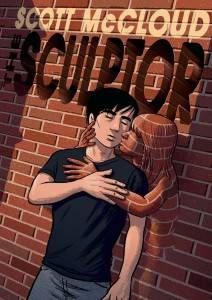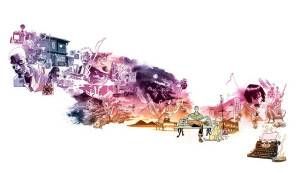
2 Big Comics with Big Ideas
These comics will pull you in, drag you under and leave you gasping in admiration. They deal with death, love, relationships… and all the big questions about what is important in life.
In a time when comics are often still dismissed as for children (or for adults who have yet to grow up) it is important to remember what comics can do. Sequential art has been around for millennia, forming some of our earliest representations of narrative, through cave paintings and hieroglyphs. Comics are a form, not a genre, and can be moulded by talented creators into different shapes, for different purposes. Just as some novels give us escapism, others try and untangle what it is that makes us human. So too can comics. These are a few of the best.
The Sculptor by Scott McCloud
 This is a big book. Big in size and big in ideas. I started reading it one night, and ended up going cover to cover. I just couldn’t put it down. I was left in the (not so) early hours of the morning, slightly dazed, emotionally exhausted and just a bit in awe of Scott McCloud.
This is a big book. Big in size and big in ideas. I started reading it one night, and ended up going cover to cover. I just couldn’t put it down. I was left in the (not so) early hours of the morning, slightly dazed, emotionally exhausted and just a bit in awe of Scott McCloud.
The Sculptor follows the story of David, a slightly conceited somewhat talented artist, young and desperate for success – often to the detriment of his personal relationships. He’s given an irresistible choice by Death disguised as his Uncle: continue his life as it is or live for only 200 days but gain the ability to shape and sculpt any material using only his hands. He sees this an opportunity to fulfil his ambitions, prizing art and his legacy over everything else. As the book progresses he struggles with this decision: art still drives him but events force him to reconsider what is worthwhile in his shortened life.
Beautifully illustrated in black, white and blue, it is a book with intellectual heft and emotional weight. Scott McCloud is also a comics theorist, the author of two extremely well regarded non-fiction titles in comic form (Understanding Comics and Reinventing Comics), and he brings all his expertise and insight to this story, which unfolds with such creativity and sensitivity. McCloud highlights what is possible in comics: long-form storytelling, compelling characterisation and the intelligent exploration of ideas
The ending is devastating but perfect.
Daytripper by Fábio Moon and Gabriel Bá
 Twin brothers Moon and Bá have created a strange tale that plays with time and chronology. Daytripper opens on chapter 32, which we come to realise is the age of the main character, Brás. It is his birthday, but this is being rather overshadowed by an event that evening honouring his famous writer father, which he is expected to attend. On the way he stops in a bar for some cigarettes and is gunned down. In itself, the chapter is a beautiful realised short story, but the book continues. Untethered in time, we dart around Brás’s life, returning at pivotal and formative events without following normal chronology, and with each chapter ending in his death.
Twin brothers Moon and Bá have created a strange tale that plays with time and chronology. Daytripper opens on chapter 32, which we come to realise is the age of the main character, Brás. It is his birthday, but this is being rather overshadowed by an event that evening honouring his famous writer father, which he is expected to attend. On the way he stops in a bar for some cigarettes and is gunned down. In itself, the chapter is a beautiful realised short story, but the book continues. Untethered in time, we dart around Brás’s life, returning at pivotal and formative events without following normal chronology, and with each chapter ending in his death.
In their depiction of a repeatedly truncated life, but which spans an entire lifetime, Moon and Bá play with our expectations. This is comic writing that pushes at the boundaries of the form. However, this is not experimental fiction for its own sake. The clever manipulation of the timeline, and the repeated death of the main character server to reinforce the themes of the book. Life is transient, fleeting and unexpected, we must decide what is valuable in our passing lives.
I hope you enjoy these books as much as I did, and don’t let anyone tell you comics are just for kids…although there are many great comics for kids! I think it might be helpful, and here I differ from recent Comics Laureate Charlie Adlard, to describe such books as graphic novels – even if just to distinguish between continuous and defined narrative arcs (this isn’t a perfect distinction) and to avoid presumption of a humorous tone. Unfortunately, even if we try to ignore concepts of cultural prestige, they currently still exist. This might be a discussion for another time. Whatever you want to call them, if you’re a fan, I can’t recommend these books enough. If you haven’t read a comic before, then these are a great place to start.





